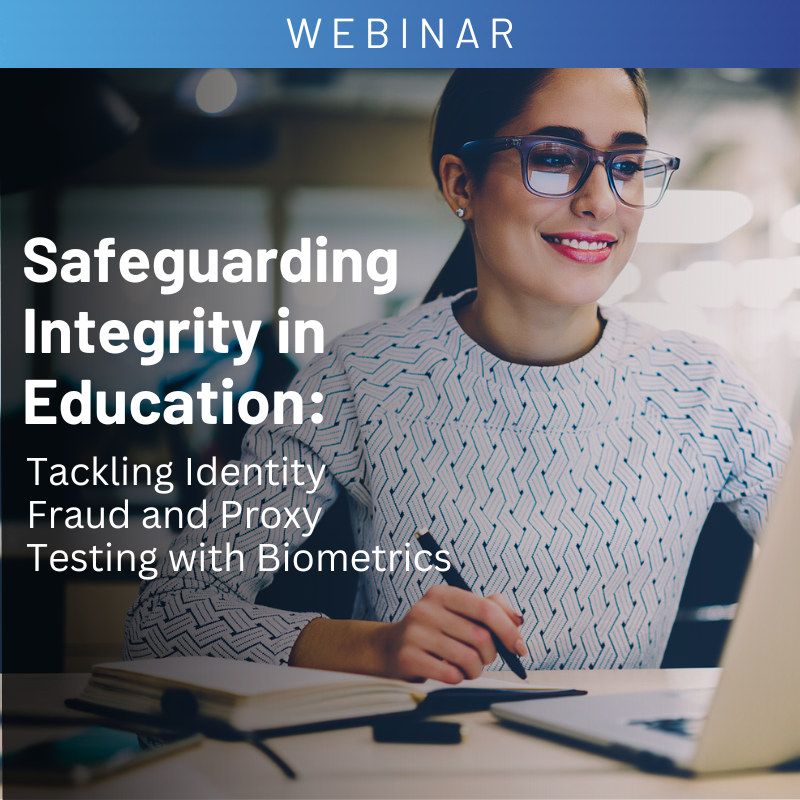Safeguarding Exam & Certification Integrity: Fighting Fraud, Balancing User Experience
December 19, 2024 | 4 minute read
“As long as there have been assessments, there’s been cheating. Technology has made it more sophisticated, but it’s also giving us the tools to fight back.” – Fraser Cargill
Integrity in certification exams was the central theme in our recent webinar, Tackling Identity Fraud and Proxy Testing with Biometrics. Featuring Fraser Cargill, Director of Global Partnerships at PeopleCert and Aware biometrics experts, we outlined the threats to educational integrity, the technological solutions being deployed, and the delicate balance between security and user experience.
The Challenges of Proxy Testing
Fraser opened the discussion by addressing a challenge that’s plagued education for decades: proxy testing, aka the practice where an individual hires another person, known as a “proxy,” to complete an exam on their behalf. Language proficiency exams, often a key step for students seeking international education opportunities, are particularly vulnerable. He recounted how test-takers sometimes resort to hiring proxy test-takers when they lack the skills to pass. Unfortunately, these fraudulent activities don’t just harm the individual; they undermine the credibility of entire institutions and the qualifications they award.
Not only that, but the fraud landscape is expanding to include advancements in artificial intelligence (AI) that have made proxy testing more sophisticated than ever. He pointed out that in recent years, the rise of deepfakes and other AI-enabled attacks has transformed the methods used by fraudsters.
“In just five minutes, I was able to create a convincing deepfake. That’s the level of sophistication we’re up against,” said Aware biometrics expert Enrique Caballero. These aren’t isolated incidents; they represent a growing threat to educational systems worldwide.
Fighting AI with AI
Fortunately, technology has also evolved to counter these challenges. For example, Fraser shared how PeopleCert has built a new security system for ensuring the integrity of its assessments. Their multi-layered approach includes biometric verification, AI-powered proctoring, and real-time monitoring. From detecting anomalies in test centers to tracking the performance of individual exam items, the complexity of managing such a system is a monumental task, but one that Fraser believes is essential to preserving trust in their certifications.
Born out of MIT and trusted by the largest federal agencies for over 30 years, Aware leverages advanced algorithms and anti-bias technology in biometric authentication to verify identities with unparalleled accuracy. These tools are being used to combat fraud not just in online education, but in high-stakes environments like banking and government. For Enrique, the mission is clear: to stay ahead of increasingly sophisticated attacks while maintaining fairness for all users. Check out more ways that biometric tech is used in online testing here.
“Our goal is to create solutions that are both secure and equitable, ensuring fairness for every user, no matter their background.” – Enrique Caballero
The Balancing Act Between Security, Privacy, and User Experience
Fraser reflected on the anxiety that many test-takers already feel during exams, emphasizing the need to avoid adding unnecessary burdens. Enrique agreed and also noted that privacy concerns often accompany the use of biometric technologies. He stressed the importance of transparency and consent, ensuring users feel confident in how their data is collected and used. In an age where privacy regulations like GDPR set strict guidelines, this isn’t just good practice—it’s essential.
“Taking an exam is already a high-anxiety experience. Our challenge is keeping the process secure without adding to that burden.” – Fraser Cargill
Looking Forward to a More Secure and Equitable Future
As the conversation turned to the future, both speakers acknowledged that the challenges are only becoming more complex. Fraser described a recent case where fraudsters had created a fake university website, complete with falsified documents and verification systems, to help students gain admission to legitimate institutions. The sophistication of such schemes underscores the need for continuous vigilance and innovation.
For Enrique, the future lies in collaboration. He spoke passionately about the importance of partnerships, not just between companies like Aware and PeopleCert, but across industries.
“This isn’t just about technology; it’s about partnerships. Together, we’re shaping the future of secure, ethical education.”
—
Interested in using biometrics to help combat fraud like proxy testing to achieve excellence and maintain brand integrity? Watch the full webinar Safeguarding Integrity in Education: Tackling Identity Fraud and Proxy Testing with Biometrics here.
